Pass 200-101 exam easily by learning PassLeader 200-101 dumps today! PassLeader now are offering the newest 200-101 exam dumps, the PassLeader 200-101 practice tests contain all real 200-101 exam questions, 100% valid now! PassLeader now supply both 200-101 VCE dumps and 200-101 PDF dumps, which are really the best 200-101 study materials! Welcome to choose PassLeader 200-101 braindumps! First Try, First Pass!
ATTENTION PLEASE!!! The 200-101 exam will be retired on 24/Sep/2016, then, the 200-101 exam will be totally replaced by the new 200-105 exam!
The newest 200-105 exam dumps collection: http://www.vce4shared.com/?s=200-105
Free 200-105 PDF dumps from Google Drive: https://drive.google.com/open?id=0B-ob6L_QjGLpUTVNc3otMV8xMkU
keywords: 200-101 exam,295q 200-101 exam dumps,295q 200-101 exam questions,200-101 pdf dumps,200-101 practice test,200-101 vce dumps,200-101 study guide,200-101 braindumps,Interconnecting Cisco Networking Devices Part 2 Exam
P.S. Download Free 200-101 PDF Dumps From Google Drive: https://drive.google.com/open?id=0B-ob6L_QjGLpU21YdXc3aEZxNUU
QUESTION 1
Refer to the exhibit. At the end of an RSTP election process, which access layer switch port will assume the discarding role?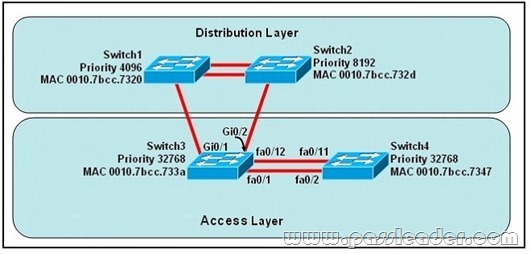
A. Switch3, port fa0/1
B. Switch3, port fa0/12
C. Switch4, port fa0/11
D. Switch4, port fa0/2
E. Switch3, port Gi0/1
F. Switch3, port Gi0/2
Answer: C
QUESTION 2
Refer to the exhibit. Why has this switch not been elected the root bridge for VLAN1?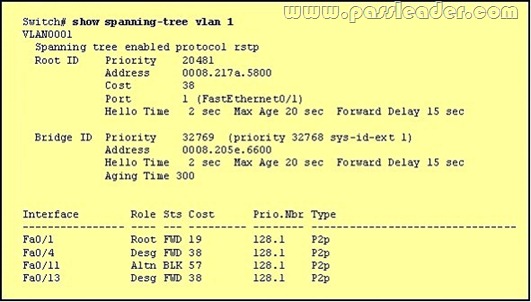
A. It has more than one interface that is connected to the root network segment.
B. It is running RSTP while the elected root bridge is running 802.1d spanning tree.
C. It has a higher MAC address than the elected root bridge.
D. It has a higher bridge ID than the elected root bridge.
Answer: D
QUESTION 3
Refer to the exhibit. Which switch provides the spanning-tree designated port role for the network segment that services the printers?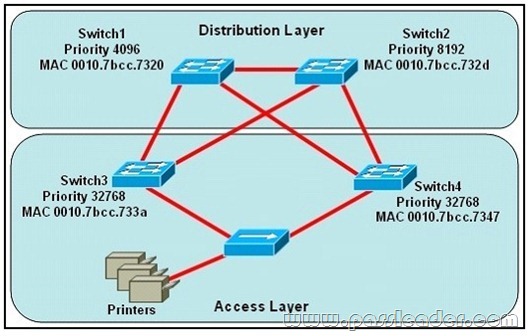
A. Switch1
B. Switch2
C. Switch3
D. Switch4
Answer: C
QUESTION 4
Refer to the exhibit. Given the output shown from this Cisco Catalyst 2950, what is the reasons that interface FastEthernet 0/10 is not the root port for VLAN 2?
A. This switch has more than one interface connected to the root network segment in VLAN 2.
B. This switch is running RSTP while the elected designated switch is running 802.1d Spanning Tree.
C. This switch interface has a higher path cost to the root bridge than another in the topology.
D. This switch has a lower bridge ID for VLAN 2 than the elected designated switch.
Answer: C
QUESTION 5
Which two of these statements regarding RSTP are correct? (Choose two.)
A. RSTP cannot operate with PVST+.
B. RSTP defines new port roles.
C. RSTP defines no new port states.
D. RSTP is a proprietary implementation of IEEE 802.1D STP.
E. RSTP is compatible with the original IEEE 802.1D STP.
Answer: BE
QUESTION 6
Which port state is introduced by Rapid-PVST?
A. learning
B. listening
C. discarding
D. forwarding
Answer: C
QUESTION 7
Refer to the exhibit. Each of these four switches has been configured with a hostname, as well as being configured to run RSTP. No other configuration changes have been made. Which three of these show the correct RSTP port roles for the indicated switches and interfaces? (Choose three.)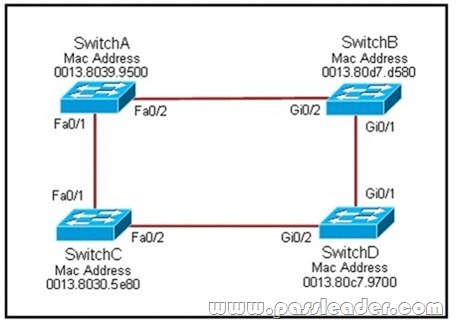
A. SwitchA, Fa0/2, designated
B. SwitchA, Fa0/1, root
C. SwitchB, Gi0/2, root
D. SwitchB, Gi0/1, designated
E. SwitchC, Fa0/2, root
F. SwitchD, Gi0/2, root
Answer: ABF
QUESTION 8
Which two states are the port states when RSTP has converged? (Choose two.)
A. discarding
B. listening
C. learning
D. forwarding
E. disabled
Answer: AD
QUESTION 9
Which three statements about RSTP are true? (Choose three.)
A. RSTP significantly reduces topology reconverging time after a link failure.
B. RSTP expands the STP port roles by adding the alternate and backup roles.
C. RSTP port states are blocking, discarding, learning, or forwarding.
D. RSTP provides a faster transition to the forwarding state on point-to-point links than STP does.
E. RSTP also uses the STP proposal-agreement sequence.
F. RSTP uses the same timer-based process as STP on point-to-point links.
Answer: ABD
QUESTION 10
At which layer of the OSI model is RSTP used to prevent loops?
A. physical
B. data link
C. network
D. transport
Answer: B
QUESTION 11
What is one benefit of PVST+?
A. PVST+ supports Layer 3 load balancing without loops.
B. PVST+ reduces the CPU cycles for all the switches in the network.
C. PVST+ allows the root switch location to be optimized per VLAN.
D. PVST+ automatically selects the root bridge location, to provide optimized bandwidth usage.
Answer: C
QUESTION 12
What are three characteristics of the OSPF routing protocol? (Choose three.)
A. It converges quickly.
B. OSPF is a classful routing protocol.
C. It uses cost to determine the best route.
D. It uses the DUAL algorithm to determine the best route.
E. OSPF routers send the complete routing table to all directly attached routers.
F. OSPF routers discover neighbors before exchanging routing information.
Answer: ACF
QUESTION 13
Which statement is true, as relates to classful or classless routing?
A. Classful routing protocols send the subnet mask in routing updates.
B. RIPv1 and OSPF are classless routing protocols.
C. Automatic summarization at classful boundaries can cause problems on discontiguous subnets.
D. EIGRP and OSPF are classful routing protocols and summarize routes by default.
Answer: C
QUESTION 14
Which parameter or parameters are used to calculate OSPF cost in Cisco routers?
A. Bandwidth
B. Bandwidth and Delay
C. Bandwidth, Delay, and MTU
D. Bandwidth, MTU, Reliability, Delay, and Load
Answer: A
QUESTION 15
Which statements are true about EIGRP successor routes? (Choose two.)
A. A successor route is used by EIGRP to forward traffic to a destination.
B. Successor routes are saved in the topology table to be used if the primary route fails.
C. Successor routes are flagged as ‘active’ in the routing table.
D. A successor route may be backed up by a feasible successor route.
E. Successor routes are stored in the neighbor table following the discovery process.
Answer: AD
QUESTION 16
Refer to the exhibit. The network associate is configuring OSPF on the Core router. All the connections to the branches should be participating in OSPF. The link to the ISP should NOT participate in OSPF and should only be advertised as the default route. What set of commands will properly configure the Core router?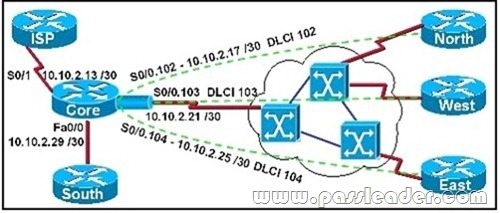
A. Core(config-router)# default-information originate
Core(config-router)# network 10.0.0.0 0.255.255.255 area 0
Core(config-router)# exit
Core(config)# ip route 0.0.0.0 0.0.0.0 10.10.2.14
B. Core(config-router)# default-information originate
Core(config-router)# network 10.10.2.13 0.0.0.242 area 0
Core(config-router)# exit
Core(config)# ip route 0.0.0.0 0.0.0.0 10.10.2.14
C. Core(config-router)# default-information originate
Core(config-router)# network 10.10.2.16 0.0.0.15 area 0
Core(config-router)# exit
Core(config)# ip route 0.0.0.0 0.0.0.0 10.10.2.14
D. Core(config-router)# default-information originate
Core(config-router)# network 10.10.2.32 0.0.0.31 area 0
Core(config-router)# exit
Core(config)# ip route 0.0.0.0 0.0.0.0 10.10.2.14
Answer: C
QUESTION 17
Refer to the exhibit. Which two statements are true about the loopback address that is configured on RouterB? (Choose two.)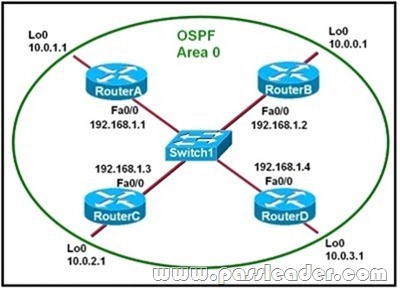
A. It ensures that data will be forwarded by RouterB.
B. It provides stability for the OSPF process on RouterB.
C. It specifies that the router ID for RouterB should be 10.0.0.1.
D. It decreases the metric for routes that are advertised from RouterB.
E. It indicates that RouterB should be elected the DR for the LAN.
Answer: BC
QUESTION 18
What is the default maximum number of equal-cost paths that can be placed into the routing table of a Cisco OSPF router?
A. 2
B. 4
C. 16
D. unlimited
Answer: B
QUESTION 19
Which parameter would you tune to affect the selection of a static route as a backup, when a dynamic protocol is also being used?
A. hop count
B. administrative distance
C. link bandwidth
D. link delay
E. link cost
Answer: B
QUESTION 20
What are two drawbacks of implementing a link-state routing protocol? (Choose two.)
A. the sequencing and acknowledgment of link-state packets
B. the requirement for a hierarchical IP addressing scheme for optimal functionality
C. the high volume of link-state advertisements in a converged network
D. the high demand on router resources to run the link-state routing algorithm
E. the large size of the topology table listing all advertised routes in the converged network
Answer: BD
Download the newest PassLeader 200-101 dumps from passleader.com now! 100% Pass Guarantee!
200-101 PDF dumps & 200-101 VCE dumps: http://www.passleader.com/200-101.html (295 Q&As) (New Questions Are 100% Available and Wrong Answers Have Been Corrected!)
P.S. Free 200-101 PDF dumps download from Google Drive: https://drive.google.com/open?id=0B-ob6L_QjGLpU21YdXc3aEZxNUU (Explanation For Every Question Is Available!)